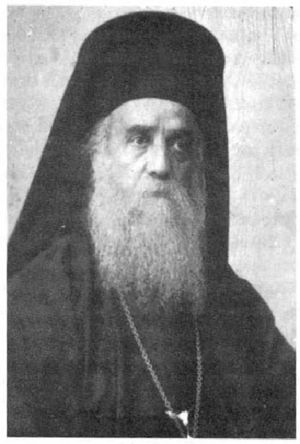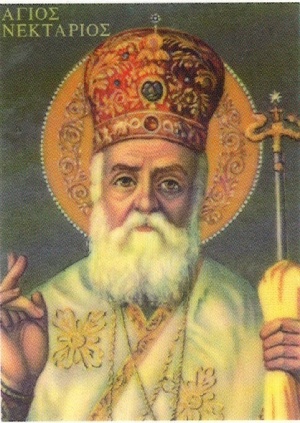Nectaire d'Égine
| Cet article (ou bien des fragments) est proposé pour être traduit en français!
Si vous désirez assumer la traduction (partiellement ou intégralement), annoncez svp cela dans la page de discussions de l'article. |
Saint Nectaire d'Égine (1846-1920), archevêque de la Pentapole et thaumaturge d'Égine, a été officiellement reconnu comme saint par le Patriarcat de Constantinople en 1961. Bien qu'il soit mort le 8 novembre (1920, à Athènes), l'Église Orthodoxe le commémore le 9 novembre, mais aussi le 3 septembre, jour de la translation de ses reliques. Il est le fondateur du Monastère de la Sainte-Trinité à Égine.
Sommaire
[masquer]Vie
St. Nectaire est né le 1er octobre 1846 à Silivri (Selymbria), en Thrace, au bord de la mer de Marmara, dans une famille modeste. On lui a donné le nom de Anastase Céphalas.A l'âge de 14 ans il vient travailler et poursuivre son éducation à Constantinople. En 1866 il quitte la capitale Constantinople pour aller sur l'île de Chios comme enseignant. Ici, il devient moine au monastère Néa Moni à l'âge de trente ans.
Trois ans après la tonsure monastique, il est ordonné diacre, prenant le nom de Nectaire. Il a reçoit un diplôme de l'université d'Athènes en 1885. Pendant les années d'études à l'Université d'Athènes il écrit plusieurs livres, pamphlets, et commentaires bibliques.
Par la suite, il gagne le Caire et d'Alexandrie, en Égypte, où il est ordonné prêtre and served the Church of Saint Nicholas in Cairo with great distinction. In recognition of his piety and brilliance as a preacher, as well as his administrative ability, he was consecrated Bishop/Metropolitan of Pentapole (an ancient diocese in Cyrénaïque, in what is now Libya) by the Greek Orthodox Patriarch Sophronios in 1889.
He served as a bishop in Cairo for one year, but was then unjustly removed from his post. Jalousé et odieusement calomnié à cause de la grande sympathie qu'il a gagné auprès du peuple orthodoxe, il doit quitter l'Égypte. Le Patriarche Sophronios refuse de l'écouter et l'expulse hors de l'Égypte sans procès ou explications, et sans lui donner la possibilité de se défendre.
After his dismissal, he returned to Greece in 1891 and spent several years as a preacher (1891-1894). He was then appointed director of the Rizarios Ecclesiastical School for the education of priests in Athens, where his service was exemplary for fifteen years. He developed many courses of study and wrote numerous books, all while preaching widely throughout Athens.
In 1904 at the request of several nuns, he established a monastery for them on the island of Aegina. The monastery was named Holy Trinity Monastery.
In December of 1908, at the age of 62, St. Nectarios resigned from his post as school director and withdrew to the Holy Trinity Convent on Aegina, where he lived out the rest of his life as a monk. He wrote, published, preached, and heard confessions from those who came from near and far to seek out his spiritual guidance.
While at the monastery, he also tended the gardens, carried stones, and helped with the construction of the monastery buildings that were built with his own funds. He was also the Metropolitan of the island of Aegina.
St. Nectarios died on the evening of November 9, 1920, at the age of 74, following hospitalization for prostate cancer. His body was taken to the Holy Trinity Convent, where he was buried by a Priest-Monk named Savas, who later painted the first icon of St. Nectarios. The funeral of St. Nectarios was attended by multitudes of people from all parts of Greece and Egypt.
Many people regarded St. Nectarios as a saint during his lifetime because of his prayerful life, his humility, his purity and other virtues, and his writings, as well as the miracles he performed. St. Nectarios also had the gift of prescience.The relics of St. Nectarios were removed from the grave on September 2, 1953, and gave out a beautiful fragrance. Official recognition of Nectarios as a saint by the Ecumenical Patriarchate of Constantinople took place on April 20, 1961. Thousands of miracles have been attributed to his intercession, particularly cases of cancer or other serious illnesses being cured.
Decision of the Church of Alexandria
Alexandria 15th September 1998
The Holy Spirit has enlightened the gathered members of the Holy Synod of the Patriarchate of Alexandria and all Africa, under the leadership of H.B. Petros VII, Pope and Patriarch of Alexandria and all Africa, more than a century since Saint Nektarios, the great Teacher and Father of the Holy Eastern Orthodox Church was expelled from the Church of Alexandria, to reach the following decision:
Taking into account the resolution of the Church to rank Saint Nektarios amongst the saints because of his innumerable miracles and his acceptance within the religious conscience of Orthodox Christians throughout the world, we appeal to the mercy of the ever-charitable God.
We hereby restore the ecclesiastical order of the Saint of our Century, Saint Nektarios, and grant to him all due credits and honors. We beseech Saint Nektarios to forgive both us, unworthy as we are, and our predecessors, our brothers of the Throne of Alexandria, for opposition to the Saint and for all which, due to human weakness or error, our Holy Father, Bishop of Pentapolis, Saint Nektarios, suffered.
PETROS VII
By the Grace of God
Pope and Patriarch
of Alexandria and All Africa.[1]
Special Relationships
- Philotheos (Zervakos) - From the Holy Monastery of Panagia Myrtidiotissa, Elder Philotheos wrote a well-known apologetic in 1976 addressed to Archimandrite Cyprian.[1] This letter (cf. External links) is considered of extreme historical importance in the Orthodox Church since it is written in defense of his spiritual father, St. Nectarios.
- Amphilochios (Makris) - he always had a great desire to meet the holy Metropolitan. When His excellency asked him, "What the greatest and most singular desire of his soul was", the elder responded in simplicity, "I wish that everybody would become monastics". The elder is the only person who was invited by the Saint to stay overnight in his private quarters.
Hymnes
Apolytikion in the First Tone: O faithful, let us honor Nectarios, divine servant of Christ, offspring of Silivria and guardian of Aegina, who in these latter years was manifested as the true friend of virtue. All manner of healing wells forth for those who in piety cry out, "Glory to Christ who glorified you; glory to Him who, through you, wrought wonders; glory to Him who, through you, works healing for all."
See also
- Agni Parthene, a hymn written by St. Nektarios
References
- Aller ↑ The most reverend Cyprian, Dr. Theol., is the Metropolitan of Oropos and Fili and President of the Holy Synod in Resistance, Orthodox Church of Greece. He is the spiritual son of Elder Philotheos.
Liens externes
- A Brief Account Of The Life Of St. Nectarios, Metropolitan of Aegina by Fr. Nektarios (Demetrios) Serfes
- In Honor of St. Nectarios
- A Lamp Lighted by God - St. Nectarios of Aegina
- Saint Nektarios of Egina (Life and Writings)
- Writings Of Saint Nectarios Of Aegina: Selected Passages From The Writings Of Orthodox Saints
- Some Miracles of St Nectarios Metropolitan of Pentapolis
- Visiting Aghios Nectarios, Aegina island, Greece (departing from Athens) - With photos
- Icon of St. Nectarios of Aegina
- YouTube video about St. Nectarios of Aegina

